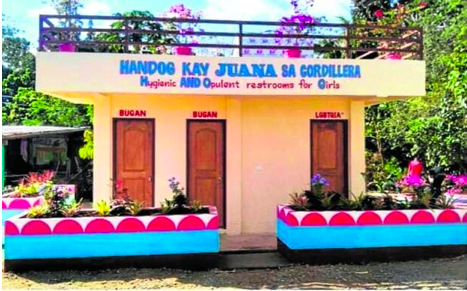
NOT JUST FOR HIM OR HER | To prevent discrimination and promote a gender-friendly environment, Ubao National High School in Ifugao built a restroom for their LGBTQ students, a small victory for gender rights and equality. (CONTRIBUTED PHOTO)
BAGUIO CITY, Benguet, Philippines — There is now a restroom for LGBTQ pupils of an Ifugao high school that will be opened next week as part of a “gender-friendly” innovation being developed for Cordillera schools, an official of the Department of Education (DepEd) said on Wednesday.
More schools will follow the lead of Ubao National High School in Aguinaldo town, said Sasha Joseph Daganos, a transwoman who heads the DepEd Cordillera human resources division.
The schools divisions supervising Ifugao, Mountain Province, and Benguet have signified their intention to build more comfort rooms for the LGBTQ community, she said.
LGBTQ is the term for lesbian, gay, bisexual, transgender, and queer that is used to describe the diversity of people’s sexual orientations and gender identity.
Daganos said she advocated for LGBTQ classrooms in rural Cordillera where community resistance to homosexuality used to prevail.
Now in her 40s, she said, “I was born during the time when elders condemned homosexuality in villages. It was taboo.”
Visible, accepted
“But the older and extremely conservative generation has since passed away, and social media, coupled with the much younger generation of parents, has made LGBTQ teens more visible, if not yet totally accepted,” Daganos told the Inquirer in an interview.
The DepEd is developing a survey to determine how many LGBTQ pupils would require designated restrooms.
The Ubao pilot restroom would have cubicles that could accommodate both gay boys and lesbians “to separate them from other teens who may intimidate them if they share conventional restrooms,” Daganos said.
She did not say how many pupils were enrolled in that high school but clarified that LGBTQ bullying issues in highland schools have not gone beyond the occasional teasing.
“Designing the survey or inventory will need to be delicate. Not all youths have determined their sexuality at their age and some may still be closeted,” she said.
Daganos said she secured clearance in January 2022 to develop the first LGBTQ toilet facility and a modern comfort room that would serve as “hygienic and opulent restroom” for teen girls.
At a news briefing about Gender and Development Focal Point System in the Cordillera last year, DepEd Cordillera Director Estela Cariño said highland teachers have taken pains to explain sexual orientations and their ramifications on families and society to pupils, usually when “school bullying” is discussed in classrooms.
In 2012, the DepEd issued DepEd Order No. 40, or DepEd Child Protection Policy, that protects children from violence, abuse, and exploitation regardless of their sexual orientation and gender identity
Behavior change
“We have to provide answers when a pupil asks, ‘why am I different?’ or ‘why do I have only a mother for a parent?,’” she said.
Cariño said the DepEd preferred teachers trained to expound on sexual identity in the same manner trained specialists teach sex education.
Community accounts dating back to the 1930s have indigenous Cordilleran stories about homosexuality, which “was not made a big deal” in some upland towns, according to an LGBTQ study presented in 2019 by the Cordillera Women’s Education, Action Research Center led by its executive director Cynthia Dacanay Jaramillo.
But in the 1960s and 1970s, behavior changed when gay men, some as cross-dressers, became a visible subculture in highland urban communities, according to a study that said the older generation was prone to judge or humiliate gay men due to the value given to procreation by traditional culture.
Lesbians did not receive the same scale of abuse because “male roles” that women could perform were “given more importance.”
The study said this societal pressure explains why certain “sexual unions could be dissolved when couples were unable to bear children” and why “couples without children are looked down upon, especially for women.”
Tradition also led to discrimination of gay men “because they say [this gender group is] useless during tribal wars.”
But the modern economy changed perceptions about homosexuals.
“Families become more tolerant when [LGBTQ relatives or children] are the ones taking care of their financial needs,” the study said.
Gender-neutral uniforms
With LGBTQ restrooms setting a start, gender-neutral school uniforms may be next, if the Senate promptly takes up the Sexual Orientation, Gender Identity and Expression and Sex Characteristics (SOGIESC) Equality bill that considers a measure for gender-neutral uniforms.
Bataan lawmaker Geraldine Roman, who chairs the House of Representatives committee on women and gender equality, said in a statement on Wednesday, “Pants may provide defense but the Sogie bill offers sure protection against abuse.”
She noted the proposed measure to give girls the choice of wearing pants as part of their uniform to protect them against harassment while traveling to and from school.
Roman said, “The Sogie bill provides clear protection against discrimination and harassment not only in schools but also in workplaces and other public places.”
“With the proposal to have gender-neutral uniforms in schools, it is now timely for the Senate to prioritize the discussion on the Sogie bill which should have been a law and implemented a long time ago,” she said.
Roman urged her peers in Congress to “take action” and ensure “no one is harassed because of their choice of clothing.”